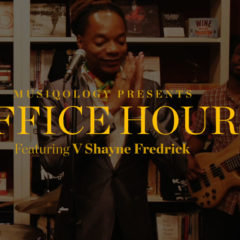We thought we’d use our platform to signal-boost a wonderfully thoughtful piece of writing on Jay Z, Tidal, and capitalism by Kitanya Harrison. Harrison’s piece, originally published on Medium, explores the news of false streaming data from Tidal. The music industry has a sordid history of impropriety from the days of payola and the underpayment of royalties to studio musicians, but Harrison illustrates the particularities of this new indignity within a larger frame that connects Tidal to the structures and failures of capitalism itself. This should be required reading for music-industry studies courses, and we are happy to share it here on MusiQology with an eye always towards thinking through what a critical music industry study research program needs to address. “What if the music industry’s struggle to adjust to a digital marketplace isn’t about the inability to adapt to changing formats?” she rightly asks. “What if they’re a microcosm of the entire American capitalist endeavor ?
Norwegian newspaper, Dagens Næringsliv (DN), has released an explosive investigative report containing damning allegations about the business practices at TIDAL, the streaming service owned by Jay-Z. The paper obtained a hard drive alleged to contain internal streaming data from TIDAL. According to DN’s report, an examination of its contents revealed the data had been manipulated to inflate the streams of Beyoncé’s Lemonade and Kanye West’s The Life of Pablo by a combined 320 million plays. Both of these projects were exclusive to TIDAL at the time of their releases in 2016 — a huge coup for the fledgling company.
If true — TIDAL has maintained they are not — these allegations will land Jay-Z and TIDAL in extremely hot water. If the company did fraudulently allocate additional streams to the wife and then-close friend of the owner of the company, TIDAL would have unjustly enriched them and deprived other artists of their fair share. The accusations follow claims of inflated subscriber numbers and further darken the cloud of suspicion over TIDAL’s stats.
The record business has always been dirty. Everyone jukes the stats. So I’m not surprised there was some finessing of the numbers. I was, however, taken aback by the allegation that not only had TIDAL gone into subscribers’ accounts to fiddle with their play counts, but that the numbers were manipulated in ways that didn’t make sense and would immediately raise red flags (e.g., multiple streams playing at the same time, streams repeating after time intervals that were always multiples of six, albums being played all day and through the night for days in a row). It’s outlandishly corrupt behavior, but it’s easy to understand why TIDAL would have done this:
Streaming music doesn’t pay.
This is why I was surprised Jay-Z tossed his hat into the ring after a decade of watching Spotify fail to turn a profit. As A&R legend, Jimmy Iovine, has sagely pointed out, Apple and Amazon have other incredibly profitable sources of revenue to subsidize their music streaming services while they try to crack the code of monetizing music in the 21st century. Gathering a huge audience and holding on to it is valuable, if you can afford to eat the cost. Jay-Z can’t. He needs TIDAL to be a financial success. Getting two of the biggest stars on the planet to be exclusive to TIDAL and coming out the other side with huge numbers was the master plan, but it would appear they didn’t have the subscriber base to pull it off.
Jay-Z’s reputation as an astute entrepreneur has propelled him into a different realm of celebrity. He’s not just a rapper; he’s a mogul. Or in his words: he’s not a businessman; he’s a business, man. TIDAL’s struggles are shining an uncomfortably bright light on this aspect of the lore surrounding him. The inevitable question is: How much of Jay-Z’s success as an entrepreneur is smoke and mirrors?
Hip-hop is about hustling and faking it ’til you make it. Entrepreneurship undergirds the culture, as does flaunting your success through conspicuous consumption and over-the-top displays of wealth. Hip-hop has evolved from talking about street-level drug deals and buying rope chains to discussing real estate investments, purchasing high-brow art, and travel by private jet. The culture has always been about “getting money,” but along the way, hip-hop became hyper-capitalist. In this way, it may be the most quintessentially American art form.
It’s arguable that Jay-Z has personified the maturation of hip-hop better than any of his peers. Dr. Dre is too reclusive to wear the crown, and Diddy is too clownish. Jay-Z walks the line between mysterious money man and cool pitch guy better than anyone. And his rise from the Marcy Projects is exactly the kind of rags-to-riches story America loves. He’s built himself into the perfect ambassador for hip-hop and postmodern American capitalism.
What happens to Jay-Z, what happens to hip-hop, if capitalism isn’t cool anymore?
Only 19% of Americans between the ages of 18 and 29 identify as capitalists. That is a staggering number, one that signals a sea-change in how America defines itself as these young people age.
What if the music industry’s struggle to adjust to a digital marketplace isn’t about the inability to adapt to changing formats? What if they’re a microcosm of the entire American capitalist endeavor — a structure nearly everyone under 30 seems to have lost faith in? Will that faith be battered even more if TIDAL is revealed to be a house of cards, blown over by the stiff wind of scrutiny?
The economics of the new millennium are starting to make the “I can sell water to a well” braggadocio of hip-hop entrepreneurship look a little funny in the light. Things will truly be a wrap for some of these elder statesmen when it becomes corny. And I think we’re heading there, because in a world of instant information, it’s too hard to hide the truth under a rock. At some point, the strobe lights have to stop flashing in the club, and we all have to walk out into the wee hours of the morning and assess our life choices.
Did you know Jay-Z’s stake in the Nets was only 0.067%? Would so many Black Americans have been running around calling him a co-owner with the same pride ringing in their voices if they’d known that?
Celebrity is a mirage. Constructing it is a sleight-of-hand business, one that Jay-Z has mastered. And it’s been entertaining to watch. But it’s time for the rest of hip-hop — particularly us older consumers — to grow up. We need to stop believing everything we see posted on Instagram, and a lot of what we see in the pages of Forbes and The Wall Street Journal. It’s not only streaming numbers that get fudged — those net worth figures so many love to cite are inflated, too. And too many people don’t understand what those numbers even mean, if you were to take them at face value. That’s why when Diddy said he wanted to buy the “North Carolina Panthers,” so many of you believed he could.
The wealth of Black celebrities — who are the totems of Black success — isn’t what it seems. And the sooner we wake up to that, the sooner we’ll realize that entrepreneurship isn’t going to save Black communities.
I know I just killed Santa Claus for some of you, so let me be clear: I’m not saying Black-owned businesses are destined for failure. I’m saying that touting entrepreneurship as the path for Black economic opportunity is relying on individualized solutions to address massive collective problems. So many programs for Black youth — from organizations as varied as the NAACP to Colin Kaepernick’s Know Your Rights Camp — seem to have entrepreneurship at or near the center of their strategy to facilitate economic advancement for Black people. That scares me. And here’s why:
Capitalism has failed.
I didn’t say “capitalism will fail unless ‘x’ happens” I said: CAPITALISM HAS FAILED.
I’ve just emptied another clip into Santa, I know. But now that we’re truly beginning to see the ravages of climate change — all the result of capitalism’s vagaries — can we afford to keep fooling ourselves? Our way of life, all this consumption and acquisitiveness, all this waste, isn’t just spiritually and emotionally unsatisfying, it is suicidal. It is geocidal. We are destroying the climatic conditions required for our species to survive.
I am Jamaican. I don’t have the luxury of lying to myself anymore. I saw what happened last hurricane season. It will be my country’s turn soon.
Category 4 and 5 storms bearing down on the Caribbean every year is going to destroy our economies. Micro loans and small business workshops aren’t going to fix that. What happened in Houston and South Florida will keep happening, too. Megastorms, extended droughts, and other environmental catastrophes are going to violently upend people’s lives regularly. How is anyone supposed to create wealth if they have to rebuild from scratch every few years?
Capitalism has failed us.
Entrepreneurship isn’t going to save us.
Black and Brown people in the Global South are already being brutally punished for the environmental malfeasance of the West. As are Black and Brown people in America. And it’s only going to get worse. It’s not an accident that Flint still doesn’t have clean water, while Nestle has bottling rights at a fresh water source nearby that it pays next to nothing for. That is capitalism functioning as intended.
Water and food.
These will be the next battle grounds. The poisoning of the earth will reach a tipping point from which there will be no return. Why do you think real-life Bond villains Elon Musk and Jeff Bezos are talking about space travel and colonizing Mars? The apex hyper-capitalists we’ve been conditioned to lavish with praise for hoarding wealth as they bust unions and pay their workers starvation wages are gaming things to their logical conclusions while we’re out here talking about teaching inner-city kids to code. Machine learning means that soon enough, the computers will be writing code themselves. Apps will write other apps. Meanwhile, robotics is being fine-tuned for the dexterous work only human hands could perform.
Work as we know it today will become obsolete. Under the ethos of capitalism, that makes human beings who are no longer needed for their labor obsolete, too.
We’ll still need water. We’ll still need food, but there’ll be no way for us to earn the money to pay for it. And the degraded environment will make these absolute necessities scarce.
Look at what the capitalists have done, how readily and outrageously they’ve violated other human beings just to make an extra buck. And when they finally, finally realize they can’t drink the oil or eat the money, how far will they go? When the check comes due, what does history tell us they’re going to do to our Black asses? What are they going to do to Indigenous people?
Flint is a preview of horrific coming attractions.
Capitalism has failed, but it is still strong enough to have us all by the throat. I don’t know how to get myself out of it. I don’t think anyone does. What I do know is that we have to work towards some kind of post-scarcity model. This will require a massive redistribution of wealth. Reparations for slavery and colonialism are a necessary first step. As is some sort of universal basic income.
Hip-hop’s super-capitalist belief system makes it unfit for this brave new world. But I’m not going to tell anyone what they can and can’t rap about. And I’m certainly not going to tell anyone not to try and get their money. Not when, with things as they are right now, amassing as much wealth as possible is the only chance you have of protecting your family. What I am going to do is listen to people discussing the issues seriously and working towards formulating viable solutions.
We need to wake up and stop paying attention to anyone who thinks getting enough Black people to aspire to “put in the work” to fly private is some sort of political action. It’s Reaganomics in blackface — trickle-down economics rooted in magical thinking that enriches the few at the expense of the many.
Income inequality is at Gilded Age levels. Citizens of the richest nation to grace the face of the earth don’t have access to drinking water. In New York, Black mothers are twelve times more likely to die from complications of childbirth than White mothers. Education and income level do nothing to mitigate those risks. “Rising and grinding” and “doing for self” aren’t going to solve these problems.
We need to tune out the clownery. But even that may be impossible as we try to negotiate the absurdity of end-stage capitalism. And it is nothing if not absurd — just look to the White House for evidence.
What Trump’s presidency has at least revealed is the hypocrisy of capitalism’s claims to being a meritocracy. Mediocrity will nearly always beat out hard work, if mediocrity has access to capital and hard work doesn’t. And this is, in part, what hip-hop is struggling with now. The community is realizing their hustle can take them only so far, and their anthems lauding empowerment through entrepreneurship are beginning to ring hollow.
The ugly truth is that the outsized success of 90s-era hip-hop moguls had more to do with the underlying economics than their individual genius: CDs were incredibly cheap to manufacture but could be sold at a premium. A label with a roster of bankable stars could print money. The lesson is that economic opportunity is structural not individual.
The underlying structure needed to make TIDAL a ringing success just isn’t there, and we shouldn’t blame Jay-Z for that. Just like we shouldn’t blame workers who are going to continue to be replaced by technology. I hope mainstream hip-hop catches up in time to produce a soundtrack that helps us navigate this frightening era — but the way things are going, flows about the Bitcoin come-up will more likely be the next trend.

 Share On Facebook
Share On Facebook Tweet It
Tweet It








